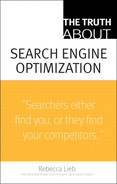The site is optimized! Can you go home now? Not on your life. For better or for worse, search engine optimization has a beginning, but it doesn’t have an end. Search doesn’t sleep, so neither can search optimization.
SEO begins with determining what keywords and phrases will help your site be found via search engines and optimizing accordingly (more on keywords later in this section). SEO is about site design and management, the technology platforms upon which the site is built, the content and the copy on the pages, and the architecture and hierarchy of that information. It’s about making the site easily “crawlable” by search engine spiders. It’s about having strong links, both inbound and outbound, to other relevant sites on the Internet (more on links in Part IV, “The Truth About Links”).
You can get all these parts right, but that doesn’t mean they’ll stay right. Search is continually evolving. If a search optimization strategy doesn’t continue to evolve and reassess itself, a site can become unoptimized faster than Yahoo! or Google can deliver search results.
Remember the term brochureware? It refers back to the early days of the Web when businesses would translate a corporate brochure, sales sheets, annual statements, executive officer biographies, and contact information onto a website. Brochureware sites were intended to be permanent. They were static.
Websites must now be ever-growing, changing, and evolving platforms for publishing content, news, and information about products and services. They must continually add (and delete) information that’s new or no longer relevant. These days, websites often feature images and rich media, such as audio and video. Often, new content, copy, features, and sections are added by different stakeholders in an organization: marketing, PR, sales, perhaps a community manager, or even the site’s own users and visitors. Websites no longer change from year to year. These days, they can frequently change and be updated minute-by-minute.
Your own website isn’t the only thing changing, of course. Your competitors’ sites, which use the same keywords and phrases you’re using, are changing, too. New sites are entering into the fray.
As the user-generated Web 2.0 revolution takes hold, much of this new content might be appearing on social media sites, some of which is beginning to get somewhat preferential treatment by the search engines. Over the past year or so, for example, Wikipedia entries have begun showing up high in Google’s results.
As you’ll recall from Truth 4, “Your reputation is on the line,” when something suddenly ranks higher on an organic results page, it usurps the position of the previous occupant of that slot, pushing other highly ranked results a bit lower on the page. A few rounds of that frequent phenomenon can cause highly ranked sites and pages to all but disappear from the first few pages of the search results. And precious few searchers have the tenacity to scan organic search results beyond the second page.
Websites, of course, aren’t the only moving target. As discussed in Truth 2, “Learn to do the Google dance,” search engines themselves are changing all the time. They change how they crawl and index sites. They change their system for ranking sites higher (and lower) in search results. And as mentioned previously, they may suddenly and without warning decide to give somewhat preferential treatment to a Wikipedia, or another specific site or genre of sites. This, in turn, affects all the other sites ranking for that specific query. A new breed of “social” search engines require human intervention for content to rank, rather than relying solely on objectively functioning algorithms.
Search engines are introducing new features all the time. This alone makes SEO even more of a moving target. With increasing frequency, it’s not just your average, run-of-the-mill web pages that show up in organic results. The Big Three search engines are pushing new products and features such as local search, video search, image search, blog search, product search, book search, and news search to their users. The past year or so has ushered in a flurry of “blended” or “universal” search results in organic results (see Truth 33, “Universal search and personalized search,” for more on universal search). The result is that SEO projects have suddenly had to take all these different search channels into account in a big way. Not only are images from videos and news stories appearing on a search for, say, “Madonna,” but these results from different search channels also are pushing “regular” search results—good, old-fashioned web pages—further down (or even off) the page.
Even the fact that search engines are featuring these new types of content in organic results has resulted in new SEO challenges—namely, optimizing all these different types of web content. A small business (say a dentist or a dry cleaner) may need to appear in local search results more than it would in general web results. That headline or press release, whether positive or negative, could be one of the first things a searcher sees. Suddenly, you may be noticing that an improperly tagged product shot or executive portrait doesn’t appear when and where it should.
Search never sleeps. So neither can the tactics or the strategy of search engine optimization. To keep a site from dropping in the rankings, pay heed to the following critical elements:
• Develop a content strategy to keep sites fresh, relevant, and attractive to spiders.
• Keep an eye on the keywords searchers use to find you. (They’re in your web analytics tool.) Watch for trends in the words and phrases used to find your site, and create relevant content and pages that address those needs.
• Pay attention to new products and services the major search engines roll out. How can your site or business benefit from local search? From mobile search? From shopping search? Map search? Not all these features are relevant to every site, but the right search channel can open up a broad avenue of new opportunities for your business.
